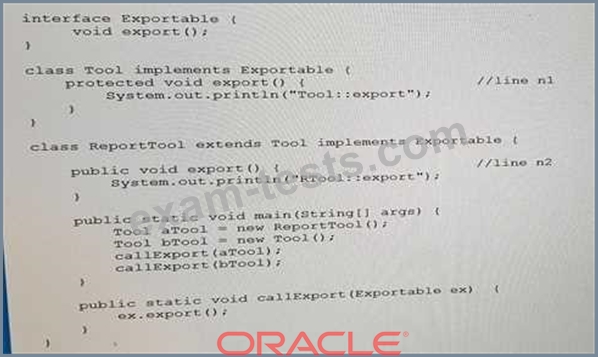Question 1
Given that data.txt and alldata.txt are accessible, and the code fragment:

What is required at line n1 to enable the code to overwrite alldata.txt with data.txt?

What is required at line n1 to enable the code to overwrite alldata.txt with data.txt?
Question 2
Given the code fragments:
class Caller implements Callable<String> {
String str;
public Caller (String s) {this.str=s;}
public String call()throws Exception { return str.concat ("Caller");}
}
class Runner implements Runnable {
String str;
public Runner (String s) {this.str=s;}
public void run () { System.out.println (str.concat ("Runner"));}
}
and
public static void main (String[] args) InterruptedException, ExecutionException {
ExecutorService es = Executors.newFixedThreadPool(2);
Future f1 = es.submit (new Caller ("Call"));
Future f2 = es.submit (new Runner ("Run"));
String str1 = (String) f1.get();
String str2 = (String) f2.get();//line n1
System.out.println(str1+ ":" + str2);
}
What is the result?
class Caller implements Callable<String> {
String str;
public Caller (String s) {this.str=s;}
public String call()throws Exception { return str.concat ("Caller");}
}
class Runner implements Runnable {
String str;
public Runner (String s) {this.str=s;}
public void run () { System.out.println (str.concat ("Runner"));}
}
and
public static void main (String[] args) InterruptedException, ExecutionException {
ExecutorService es = Executors.newFixedThreadPool(2);
Future f1 = es.submit (new Caller ("Call"));
Future f2 = es.submit (new Runner ("Run"));
String str1 = (String) f1.get();
String str2 = (String) f2.get();//line n1
System.out.println(str1+ ":" + str2);
}
What is the result?
Question 3
Given the code fragments:

What is the result?

What is the result?
Question 4
Given the code fragment:
List<String> empDetails = Arrays.asList("100, Robin, HR",
" 200, Mary, AdminServices",
" 101, Peter, HR");
empDetails.stream()
.filter(s-> s.contains("1"))
.sorted()
.forEach(System.out::println); //line n1
What is the result?
List<String> empDetails = Arrays.asList("100, Robin, HR",
" 200, Mary, AdminServices",
" 101, Peter, HR");
empDetails.stream()
.filter(s-> s.contains("1"))
.sorted()
.forEach(System.out::println); //line n1
What is the result?
Question 5
Given:
interface Rideable {Car getCar (String name); }
class Car {
private String name;
public Car (String name) {
this.name = name;
}
}
Which code fragment creates an instance of Car?
interface Rideable {Car getCar (String name); }
class Car {
private String name;
public Car (String name) {
this.name = name;
}
}
Which code fragment creates an instance of Car?

